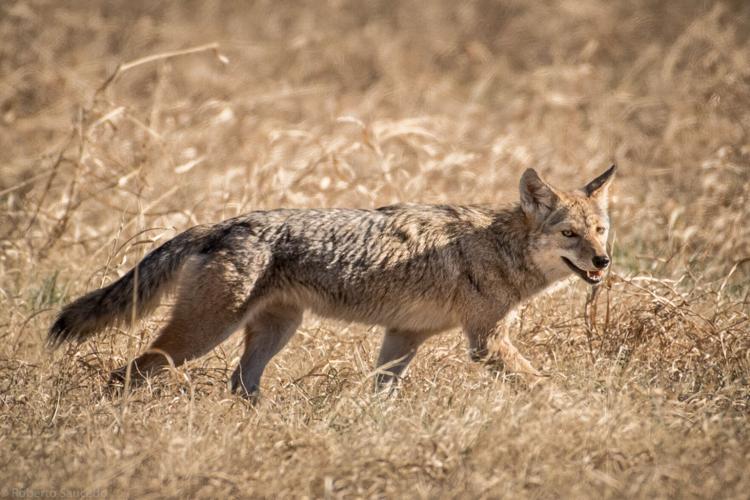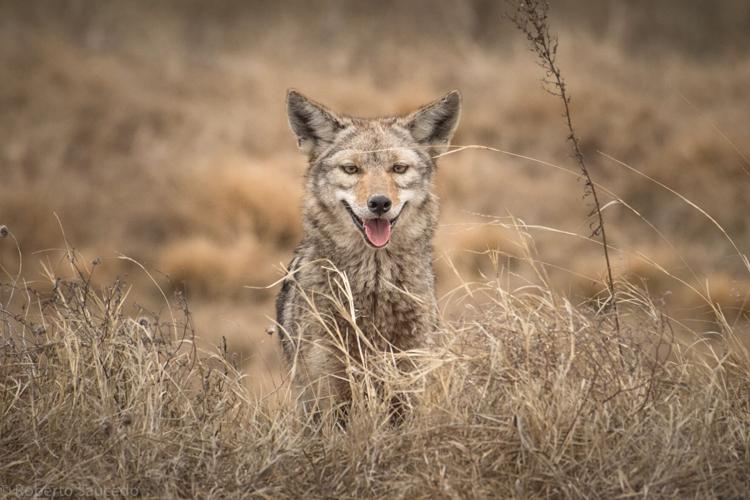“Warning: Coyote spotted in neighborhood.” You've probably seen such alerts pop up on Facebook or your neighborhood web page.
People are catching sight of the wily animals because the young ones are on the move.
“This time of year, it’s easier to see coyotes because it’s dispersal season,” said Amy Shutt, director of The Canid Project, a nonprofit fox and coyote rehab and educational collective based in Louisiana.
Dispersal is when coyote pups from the previous year (yearlings) leave the family group in search of a new home range.
Shutt has been on a mission to help local communities understand the important role coyotes and other canids, like foxes, can play in urban neighborhoods and ways to keep them from getting too close for comfort.
“We try to shed light on the concept of co-existence,” she said, noting canid is the biological family of dog-like carnivores. The caninae are known as canines, and include domestic dogs, wolves, foxes and others.
As coyotes' habitats continue to be destroyed by construction, these smart and adaptable creatures will seek food, shelter and water in urban areas.
But don't just think of them as a nuisance, Shutt said. Coyotes are important in ecosystems because they help to control the populations of mice, rats, Canada geese, rabbits and other urban mammals.
They are considered a keystone species — that is, a species on which other species in an ecosystem largely depend, so much so that if they were removed, the ecosystem would change drastically.
In addition to keeping the mammal population in check, coyotes are part of a natural clean-up crew, as they scavenge on carrion.
“Foxes and coyotes and all urban wildlife are not going away," Shutt said. "They are here to stay, and it’s our time to realize we — our lifestyles, trash and our domesticated animals — are set up smack dab in the middle of wild corridors, and are the controllable component, not the wild animals.”
To help communities address concerns about coyotes, Shutt recently published a guide, "A Coyote Management and Coexistence Plan," a free, 22-page PDF guide available online at thecanidproject.com/coyote-coexistence-guide-causes.
It’s a thorough, step-by-step program with human safety as a priority in managing human-coyote interactions.
So, just how can you keep coyotes at bay? For starters, quit being such a great host.
Food is a big draw in urban areas. That includes pet food, unsecured compost or trash, fallen fruit in yards and bird feeders, which attract rats and mice that coyotes like to eat.
Free-roaming outdoor cats and small dogs are also tasty prey for coyotes so Shutt warned to keep pets inside or watch them closely when outside.
Shutt’s guide offers several more strategies and techniques to keep coyotes away.
“We encourage friends and neighbors to share this information and follow the steps. It’s most effective when the entire neighborhood works together,” Shutt said.
Coyotes are most active at dawn and dusk and prefer the edge of open spaces and natural preserve areas over places with people. But they do thrive in areas near people.
A coyote will claim an area of 2 to 5 square miles for its home range.
Shutt, an animal lover since early childhood, became enamored with a family of foxes she and her daughter spied in a neighborhood near the LSU lakes several years ago.
“They made me get back into photography,” Shutt said.
Now a full-time photographer, Shutt teaches photography locally and leads wildlife photography expeditions in other countries.
The Canid Project was a venture she started that combines wildlife rehabilitation and education. In 2017, Shutt received a wildlife rehab license from the Louisiana Department of Wildlife and Fisheries and began rehabilitating foxes on her own.
The Canid Project is a network of people, including biologists, conservationists, wildlife rehabilitators and canid enthusiasts, that spans the United States, Canada and the United Kingdom.
For more information, visit thecanidproject.com or email thecanidproject@gmail.com.
Louisiana Master Naturalists of Greater Baton Rouge seeks to advance awareness, understanding and stewardship of the natural environment. For more information, email info@lmngbr.org







